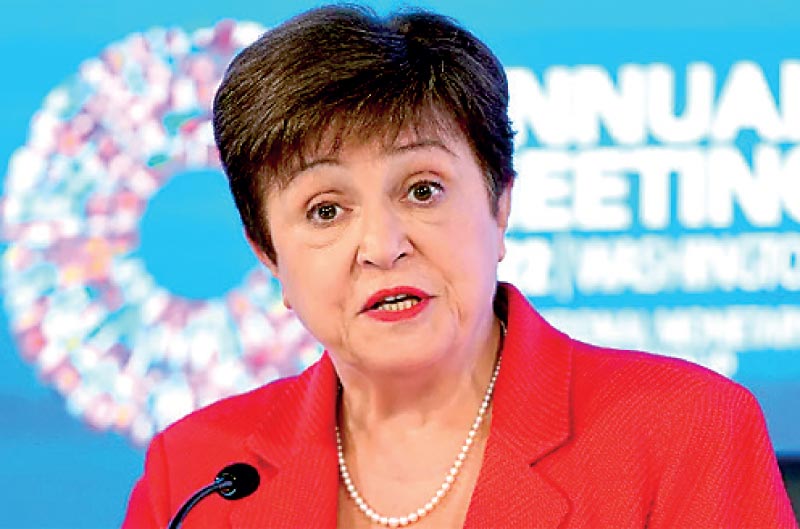Wednesday Feb 18, 2026
Wednesday Feb 18, 2026
Monday, 27 February 2023 02:41 - - {{hitsCtrl.values.hits}}

IMF Managing Director Kristalina Georgieva
The International Monetary Fund (IMF) on Saturday appraised the G20 leadership of the need for effective debt resolution for vulnerable countries including Sri Lanka.
“More predictable, timely, and orderly processes are needed both for countries under the Common Framework (CF) for debt resolution and for those not covered by it, including Sri Lanka and Suriname,” said IMF Managing Director Kristalina Georgieva during her address at the first meeting of the G20 Finance Ministers and Central Bank Governors in Bengaluru, India. Her remarks come as a follow up to Sri Lanka and the IMF discussing a $ 2.9 billion four year Extended Fund Facility program in tandem with restructuring of $ 26 billion worth of external borrowing from bilateral and commercial creditors.
“With global growth set to slow in 2023 and remain below its historical average, too many people in too many countries are struggling to make ends meet.The international community, therefore, has a responsibility to come together to find solutions for the most vulnerable members of our global family.
“This calls for urgent action to strengthen the international financial architecture, especially in the area of debt resolution and strengthening the global financial safety net,” the IMF Chief said.
In light of rising debt vulnerabilities in many countries, Georgieva told the G20 meeting that she strongly endorses efforts to strengthen the debt architecture and improve the speed and effectiveness of debt resolution.
Sovereign debt vulnerabilities, already elevated before the pandemic, she said have been exacerbated by the shocks stemming from COVID-19 and Russia’s war against Ukraine. This is particularly the case for developing and low-income countries with very limited policy space and huge development needs.
“It is therefore imperative for the G20 to strengthen the debt architecture. The G20 did so in 2020 with the Debt Service Suspension Initiative (DSSI) and by establishing the Common Framework (CF) for debt resolution. Since then, the CF delivered a debt operation for Chad. It is now critical to complete Zambia’s debt restructuring, establish a Creditor Committee for Ghana, and advance work with Ethiopia,” IMF Chief said.
“Nonetheless, more predictable, timely, and orderly processes are needed both for countries under the CF and for those not covered by it, including Sri Lanka and Suriname,” she added.
“This means that we must enhance dialogue and collaboration on debt issues. This is the goal of the new Global Sovereign Debt Roundtable (GSDR): to bring together creditors – official, old and new, and private – and debtor countries to discuss key issues that can facilitate the debt resolution process,” the IMF Chief emphasised.
Georgieva said GSDR was launched under the auspices of India’s G20 presidency last week at the deputies’ level, followed by an engaged and constructive principals meeting on Saturday. “We will further build on this discussion during the World Bank-IMF Spring Meetings in April,” she added.
She said in the IMF’s role at the centre of the Global Financial Safety Net, it has been scaling up lending as members confront the significant economic challenges that the past few years have brought.
“Through our standard lending facilities and emergency financing, the IMF has approved $ 272 billion of financing to 94 countries since the beginning of the pandemic, of which 57 are low-income countries,” she revealed.
We have also stepped up our efforts to help tackle the global food crisis. Several countries have benefited from the IMF’s new Food Shock Window, including Malawi, Guinea, and Haiti, and more are expected to do so.
According to her the new RST is providing long-term affordable finance to help members implement strong climate policies and catalyse additional financing. So far, four RST-supported programs have been approved by the IMFs Executive Board: Costa Rica, Barbados, Rwanda and Bangladesh. With many more RST requests expected, she called on IMF members for further pledges to channel SDRs to the trust.
“In a world of great uncertainty and repeated turbulence, it is critical to further bolster the IMF’s capacity to support its members. This applies most urgently to our concessional financing for low-income countries through our Poverty Reduction and Growth Facility (PRGT),” she said.
“Demand for PRGT support has reached unprecedented levels and can only be met if matched by an increase in PRGT loan and subsidy resources,” she added.
In addition, a successful quota review – which the IMF’s membership has committed to complete by December 2023 – is critical for a strong Global Financial Safety Net. The latter has always been important for global stability and is even more important in today’s challenging global environment, especially for the most vulnerable countries and people. Our common interest is to secure a well-functioning and integrated global economy, for the sake of a more secure and prosperous world.
With global growth set to slow in 2023 and remain below its historical average, too many people in too many countries are struggling to make ends meet – a point that I highlighted in my recent blog on policy priorities for the G20.
The international community, therefore, has a responsibility to come together to find solutions for the most vulnerable members of our global family. This calls for urgent action to strengthen the international financial architecture, especially in the area of debt resolution and strengthening the global financial safety net.